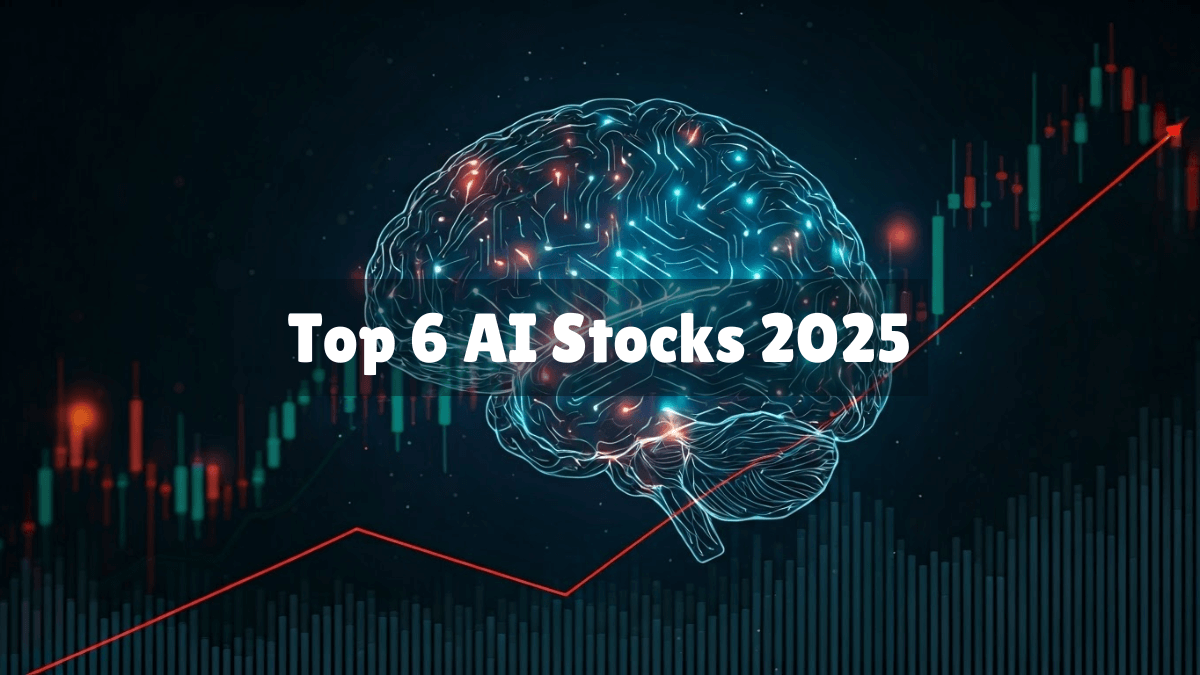Artificial intelligence (AI) is transforming industries, and investors are flocking to AI-focused stocks for their growth potential. Many top tech stocks have seen their values surge as AI adoption accelerates. In this article, we provide an overview of why AI stocks are in demand and highlight six top AI stocks to watch, along with key trends, risks, and an outlook for this dynamic sector.
Why AI Stocks Are in Demand
AI technology has shifted from research labs to real-world business applications at a rapid pace. 2023 was the year generative AI (like ChatGPT) went mainstream, and by 2024 companies began deploying AI at scale to drive value. This rising adoption has created a surging demand for AI computing power, from data centers to devices.
Tech firms and cloud providers invested billions in hardware and software to train and run AI models. The result is an AI market growing at an explosive rate – the global AI market is projected at $184 billion in 2024, up from $142 billion in 2023, and could exceed $800 billion by 2030.
Investor enthusiasm has followed these trends. Generative AI investment jumped nearly 9× in 2023, reaching about $25 billion (up from just $3 billion in 2022). By late 2024, AI startups were attracting over 30% of global venture funding.
Stock prices of AI leaders often reflect this optimism long before profits materialize. In short, AI is seen as a transformative technology with vast economic potential, which is driving a rush into AI-related stocks.
Top 6 AI Stocks to Watch
1. Nvidia (NVDA)
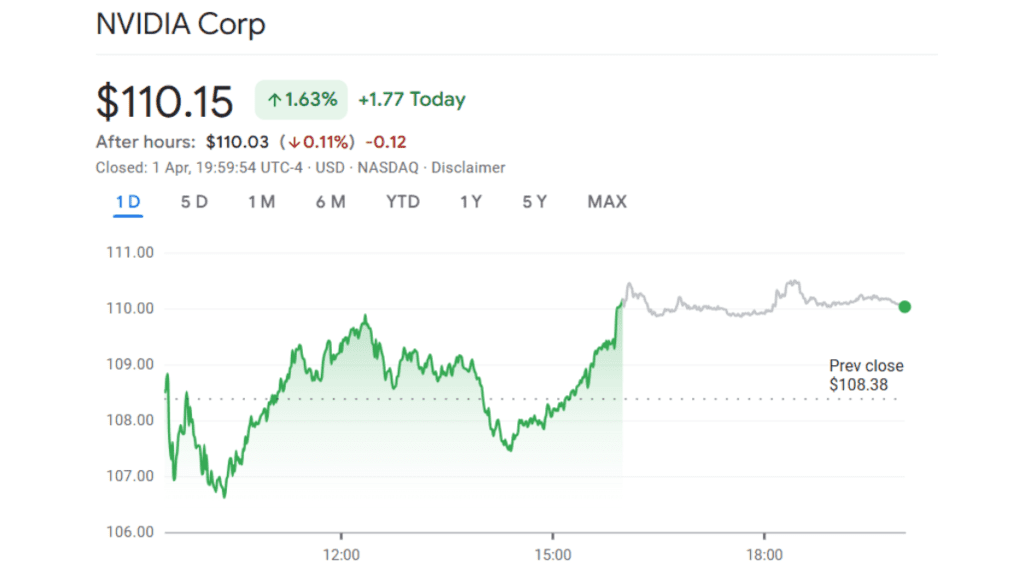
Nvidia is the backbone of the AI boom. The company dominates the market for AI-focused chips (GPUs) – it controls about 80% of the high-end AI chip market. Demand is off the charts: Nvidia’s data-center revenue (mostly from AI customers) jumped over 300% year-over-year to $22 billion in a recent quarter.
This has translated into explosive stock performance. Nvidia’s share price surged 239% in 2023 alone, making it one of the fastest-growing S&P 500 companies. Such growth has vaulted Nvidia into the top ranks of most valuable companies.
The company is not standing still – it continues to innovate with new AI chips and software. Nvidia’s AI-driven revenue is on track to keep climbing rapidly, solidifying its status as a “picks and shovels” supplier for the AI gold rush.
2. Microsoft (MSFT)
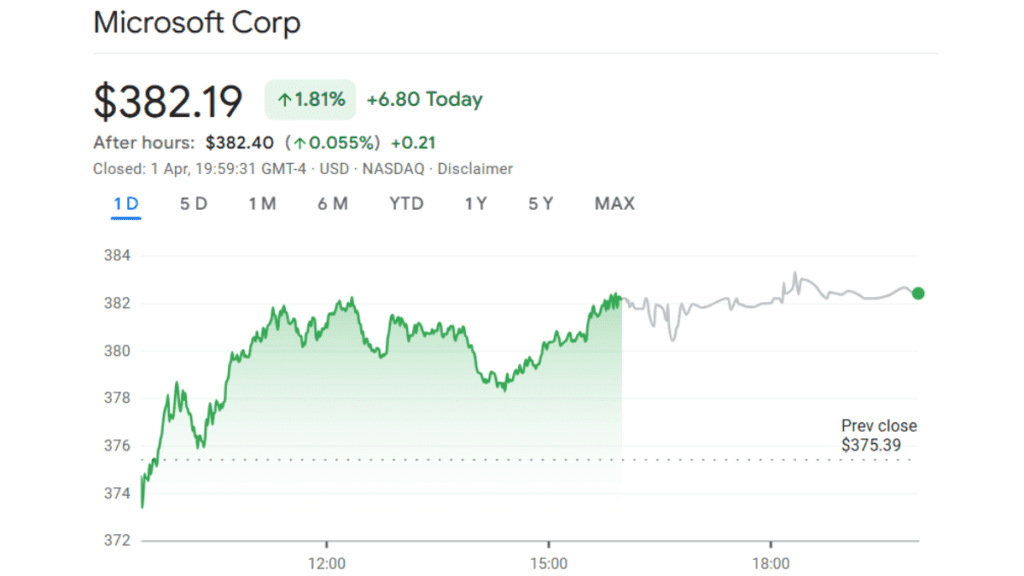
Microsoft has placed a big bet on AI and it’s paying off. The software giant invested over $13 billion in OpenAI (the lab behind ChatGPT) to supercharge its AI capabilities. This partnership gives Microsoft exclusive access to advanced AI models running on its Azure cloud.
Microsoft is now weaving AI into its products, from the Bing search chatbot to Copilot assistants in Office apps. The market has rewarded this strategy – Microsoft’s stock jumped 57% in 2023 amid excitement for its AI initiatives. The company’s cloud revenue is getting a boost as businesses adopt Azure’s AI services.
Analysts predict Microsoft could generate $50 billion in annual AI revenue within four years, underscoring the massive growth potential. With its enterprise reach and early move with OpenAI, Microsoft is viewed as a leader in the AI race.
3. Alphabet (GOOGL)

Alphabet, the parent of Google, is leveraging AI across its search, cloud, and software products. Google has long been an AI pioneer (it acquired DeepMind and developed leading AI research), but faced a challenge when newer rivals like OpenAI grabbed headlines.
In 2023, Google launched its own AI chatbot Bard and began integrating generative AI into Gmail, Google Docs, and more. It also offers AI cloud services and chips (TPUs) for developers. After an initial stumble with Bard, Google has been rapidly improving its AI offerings.
Investor confidence returned as these efforts took shape – Alphabet’s stock soared about 58% in 2023. The company’s core search business is starting to incorporate AI answers, and YouTube and advertising are using AI for recommendations. With one of the world’s largest troves of data and talent, Alphabet is poised to remain a dominant AI player, balancing innovation with its scale.
4. Amazon (AMZN)

Amazon is infusing AI throughout its operations, especially in its cloud division. Amazon Web Services (AWS) is the biggest cloud provider and the infrastructure behind many AI services. AWS offers AI tools and custom chips (like Tranium and Inferentia) that companies use to train machine learning models.
To bolster its AI capabilities, Amazon is spending up to $4 billion to support Anthropic, a promising AI startup, in a strategic partnership. This move follows Microsoft’s OpenAI deal, signaling an arms race in AI among cloud giants.
AI is also improving Amazon’s consumer business – from smarter Alexa voice assistants to optimized logistics and recommendations on its e-commerce platform. After a tough 2022, Amazon saw a strong rebound as these efforts took hold: Amazon shares surged 81% in 2023, outpacing the broader market. With its breadth of services, Amazon stands to benefit from AI on multiple fronts (cloud, retail, devices) in the years ahead.
5. Advanced Micro Devices (AMD)
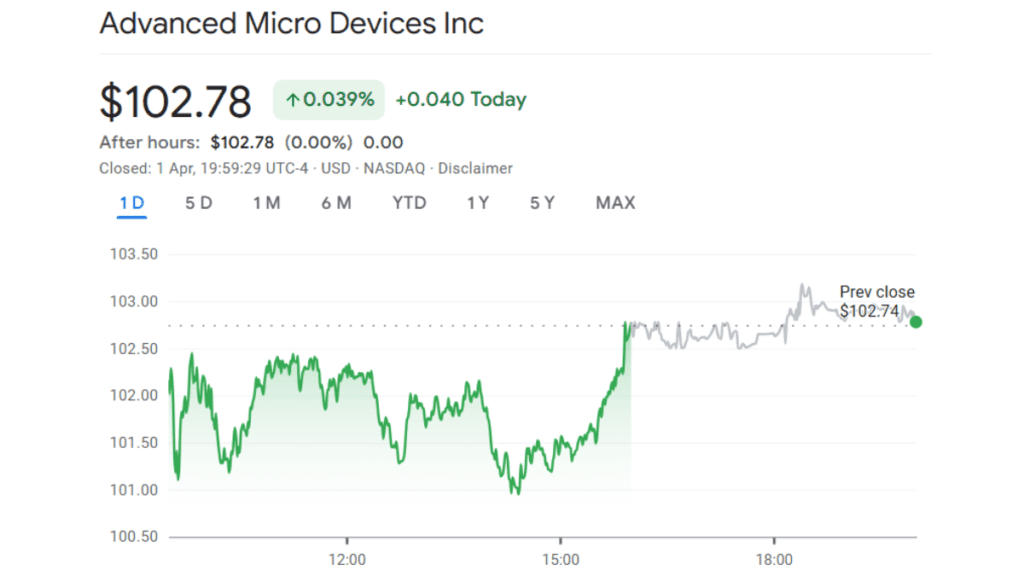
AMD is another chipmaker riding the AI wave, challenging Nvidia’s dominance. The company is known for CPUs and GPUs, and it’s rapidly expanding its AI chip lineup. In late 2023 AMD launched its new MI300X AI GPUs, designed to compete directly with Nvidia’s flagship AI chips.
It has already started winning some big customers for AI accelerators. AMD’s management is targeting about $5 billion in data center AI chip revenue for 2024– a significant jump that reflects its growing presence in AI infrastructure. Investors have taken notice. AMD’s stock has been volatile, but from the end of 2022 to late 2024 its shares climbed roughly 156% amid optimism about AI opportunities.
While still smaller than Nvidia in the AI arena, AMD benefits from a broader product range (it also powers consoles and PCs) and a reputation for innovation. If it continues to execute in AI chips, AMD could capture a bigger slice of this booming market.
6. Palantir Technologies (PLTR)
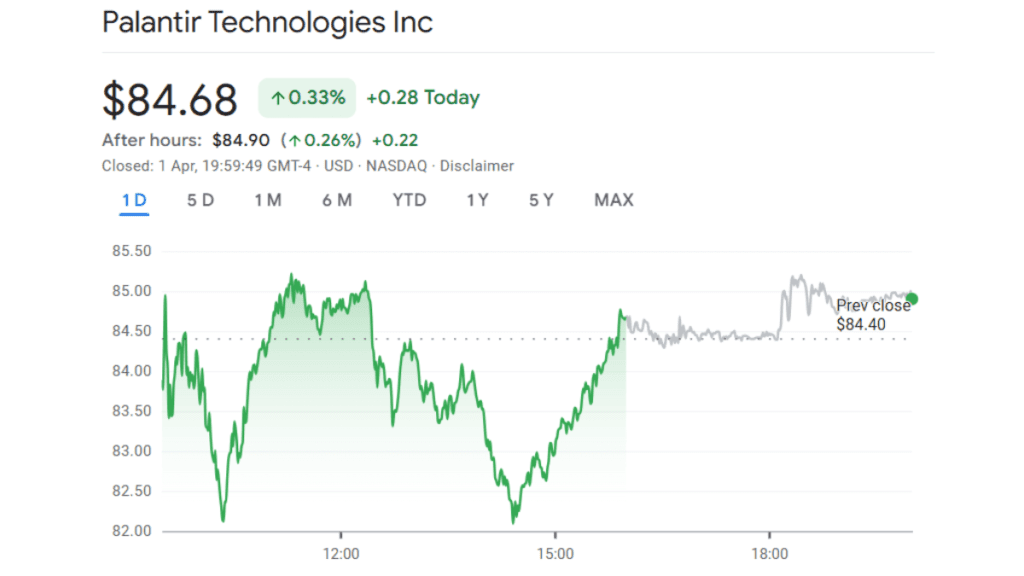
Palantir is a software company at the forefront of applied AI for big data analytics. Traditionally known for its government and defense contracts, Palantir has pivoted to offer AI platforms for commercial clients as well.
In 2023 it released the Palantir Artificial Intelligence Platform (AIP), which helps organizations harness large language models and other AI in their operations. This move is already yielding results – Palantir’s U.S. commercial revenue jumped 64% year-over-year in Q4 2024 as AI demand kicked in.
The company has also started generating consistent profits after years of operating losses. Investors have responded to its improved outlook: Palantir’s stock spiked 23% in one day after a strong earnings report highlighted 75% growth in quarterly earnings driven by AI deals. With a unique mix of government-grade AI expertise and new enterprise products, Palantir is emerging as a key pure-play AI stock to watch in the software space.
Key Trends in AI Investing
Global spending on AI is entering an exponential growth phase. For example, revenues from AI-specific chips (“accelerators”) are projected to exceed $150 billion by 2027, up from only a few billion just a few years ago.
This kind of growth underscores how integral AI computing has become across industries. A major trend is the “picks and shovels” approach – companies providing the infrastructure of AI (like chipmakers, cloud providers, and data platforms) have seen the earliest gains.
Nvidia’s meteoric rise as the top AI hardware supplier is a case in point, having “profited the most from the early investment in generative AI” as the dominant picks-and-shovels maker.
Another trend is the arms race among tech giants and startups in AI. Established players (Microsoft, Google, Amazon, Meta, etc.) are pouring billions into AI R&D and high-profile partnerships, while countless startups worldwide push innovation at a breakneck pace. The result is intense competition but also collaboration, as seen in deals like Microsoft/OpenAI and Amazon/Anthropic.
Meanwhile, AI adoption is spreading beyond tech into every sector – finance, healthcare, manufacturing, you name it. Companies in retail and fast food are deploying AI for customer service and operations, and cloud providers report that AI features are driving more client spending.
Investors are also keeping an eye on how quickly AI can be monetized. Hype vs. reality is a constant theme: after the initial excitement, the focus is shifting to real metrics like usage growth, revenue from AI services, and efficiency gains. Overall, the trajectory of AI investing suggests sustained growth ahead, but likely with swings as the technology matures and winners and losers become clearer.
Risks and Considerations
AI stocks carry plenty of hype – and with that comes risk. Valuations are a key concern: many AI-focused stocks trade at very high price-to-earnings multiples, driven by lofty growth expectations.
In some cases, stock prices have run far ahead of current fundamentals. If AI initiatives take longer to pay off or hit technical hurdles, these stocks could see sharp pullbacks. Investors should be wary of inflated valuations not yet backed by actual profits. Another consideration is the fierce competition in AI.
Tech giants are battling each other while startups are emerging rapidly – all aiming for a piece of the AI market. This race could pressure profit margins or lead to expensive R&D and acquisition battles. Regulatory and ethical risks are also on the horizon. Governments are scrutinizing AI for privacy, security, and job impacts.
New regulations (for example, rules on AI data usage or export controls on advanced chips) could impact how companies deploy AI. A recent example is U.S. export restrictions on AI chips to certain countries, which have already crimped some sales for companies like Nvidia.
Additionally, macroeconomic factors can’t be ignored – rising interest rates or a market downturn could deflate high-growth tech stocks quickly. In summary, while AI offers huge promise, investors should approach with caution: do thorough research, watch earnings closely, and be prepared for volatility in this evolving sector.
Software Stocks To Emerge As Best AI Stocks?
Some analysts believe that software companies could become the top AI stocks – but only if they figure out how to profit from new AI features and services. Many software firms are still learning how to monetize AI offerings. After early experiments with AI “copilots,” these companies are now shifting toward more autonomous, goal-driven AI agents to add value. The big challenge is turning AI pilot projects into full commercial deployments that boost revenue.
One standout is Palantir (PLTR), a data analytics firm aggressively embracing AI. Palantir helps other companies use their proprietary data to build custom AI models, and it’s been showcasing its capabilities at events like its sixth annual AIPCon (AI Platform Conference).
The company’s stock price skyrocketed roughly 340% in 2024 – making it one of the market’s top performers – and it has notched additional gains in 2025. This surge reflects investor confidence that Palantir’s AI platform strategy is paying off.
Enterprise software giant Salesforce (CRM) is also doubling down on AI. In 2024, Salesforce rebranded its Einstein AI features as a new “Agentforce” platform focused on autonomous agents. This marked a hard pivot from basic chatbots to more advanced AI helpers that can take actions on behalf of users.
The move underscores Salesforce’s commitment to weave AI throughout its product lineup. However, the financial payoff is uncertain – Salesforce’s recent outlook came in lighter than hoped even as it rolls out new AI products, and CRM stock has slumped by double-digits in 2025. Investors are watching to see if these AI initiatives can reaccelerate Salesforce’s growth.
Even the biggest tech incumbents are pushing “AI-first” software strategies. For example, Microsoft has integrated an AI assistant called Copilot across Windows, Office 365, and other products. Microsoft’s Copilot acts like a smart helper in apps like Word, Excel, and Teams, aiming to boost user productivity.
The company made its Office 365 Copilot generally available in late 2024. By embedding AI into tools that millions use daily, Microsoft is creating new reasons for customers to subscribe or upgrade – effectively monetizing AI within its vast software ecosystem. This strategy, alongside Microsoft’s major investment in OpenAI, shows how legacy software makers are striving to stay on the cutting edge of the AI revolution.
AI Stocks To Watch By Industry Group
The artificial intelligence boom spans several industries, from chips to cloud services to enterprise apps. Here are some top AI stocks grouped by sector, each with its own angle on AI:
- Semiconductors: Chipmakers supply the brains of AI systems. Nvidia (NVDA) leads in high-performance AI processors, and cloud giants are buying more of its GPUs to train models and run AI workloads. Nvidia enjoys a significant lead over rival AMD in this arena. Other chip firms like Broadcom and Marvell are also designing specialized semiconductors to support AI in data centers and devices.
- Cloud/Platform: Tech titans are building AI into their cloud platforms. Amazon (AMZN), for instance, has upgraded its AWS cloud with custom AI chips and partnered with startups like Anthropic and others to offer cutting-edge AI models as services. Microsoft (MSFT), meanwhile, is the largest investor in OpenAI and benefits as ChatGPT’s popularity drives demand for Azure cloud computing. Even Alphabet (GOOGL) is in the fray – Google is developing its own generative AI (such as the Gemini model) and offering AI tools via Google Cloud. These platform companies are leveraging their scale and infrastructure to become one-stop shops for AI development and deployment.
- Software: Many enterprise software makers are infusing AI into their products. Salesforce (CRM), for example, has pivoted from simple conversational copilots to autonomous AI “agents” that can perform tasks for users. Its goal is to boost efficiency for business clients using AI-driven automation. Other software firms like ServiceNow and Adobe are likewise introducing AI features – from helping automate IT workflows to generating content – hoping that new AI capabilities will attract customers and open up fresh revenue streams.
- Networking: The AI boom is also a networking story. Arista Networks (ANET) provides high-speed networking gear that helps connect racks of servers in AI data centers. Its switches and routers are crucial for shuttling massive amounts of data between AI chips. As internet giants and cloud providers build out “AI supercomputers,” they need more bandwidth, which has been a tailwind for Arista’s business. The company’s focus on data center networking for AI workloads has positioned it as a key beneficiary of AI-driven infrastructure spending.
- Cybersecurity: Cybersecurity firms are harnessing AI to fight cyber threats. CrowdStrike (CRWD), a leader in endpoint security software, uses AI-powered analytics to detect hacks and malware faster. Its AI algorithms sift through vast amounts of data to spot anomalies and predict attacks, helping automate work in security operations centers. This allows companies to respond to incidents more quickly and with fewer human analysts. As hackers also exploit AI, security providers like CrowdStrike are in an arms race to use AI for smarter defense.
Will AI Startups Challenge Tech Giants
A pressing question in the tech industry is whether today’s AI gold rush will be dominated by established tech giants or by a new wave of nimble AI-focused startups. The rise of OpenAI offers a case study in the latter.
In just a few years, OpenAI’s ChatGPT and related offerings have garnered huge commercial momentum – the company’s annualized revenue has surged into the billions of dollars.
Investors have taken notice: in late 2024, OpenAI secured a whopping $6.6 billion in fresh funding that valued the startup at $157 billion – up sharply from earlier in the year. This makes OpenAI one of the most valuable private companies in the world.
Notably, much of OpenAI’s backing comes from incumbent players (including a major investment from Microsoft), underscoring both the opportunity and the threat it represents to Big Tech. OpenAI’s rapid ascent shows that a well-positioned startup can achieve breakneck growth in the AI era, even alongside powerhouse partners.
Importantly, OpenAI is not alone. There is a broader cohort of AI startups aiming to reshape the industry. For instance, Anthropic – an AI lab founded by ex-OpenAI researchers – just raised billions and is now valued around $61.5 billion.
It’s backed by tech heavyweights like Amazon and Google, reflecting how big companies are hedging their bets by investing in up-and-coming AI ventures. Other notable startups include Cohere and AI21 Labs, which along with OpenAI and Anthropic are focused on large language models and generative AI.
These companies are developing advanced AI systems and APIs that anyone can build on. Their innovations are driving the field forward, and they often collaborate with the giants (for example, by training on cloud platforms or receiving strategic funding), even as they remain independent players.
The incumbent tech giants aren’t standing still, of course – firms such as Google, Meta, and Microsoft are pouring resources into their own AI research and products. Google has unveiled its Gemini AI model and Meta has open-sourced its Llama 2 model, leveraging their vast data troves and user bases to maintain an edge.
In theory, the tech titans have advantages in computing power, proprietary data, and distribution. These strengths could help them sustain leadership in AI even as startups innovate. On the other hand, the startups are laser-focused on AI and move quickly, without the baggage of legacy businesses.
They’re tackling problems in new ways and can attract top talent with the allure of cutting-edge research and equity upside. This dynamic sets up a fascinating race: nimble AI specialists versus diversified corporate behemoths.
For investors and industry watchers, the big question is whether these young AI companies will ultimately challenge the dominance of the tech giants – potentially even outpacing or disrupting them – or whether they’ll end up partnering with, and in some cases being acquired by, those same giants. In the coming years, the balance of power in the AI market will hinge on how well each side executes and how the AI ecosystem evolves.
